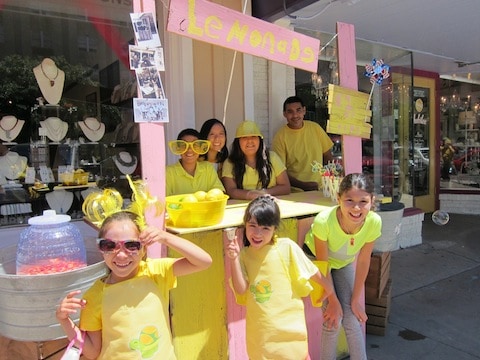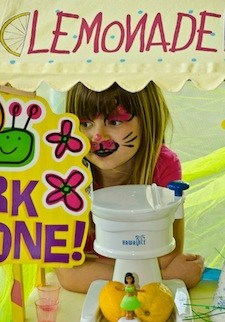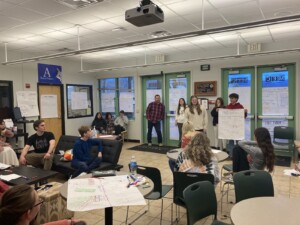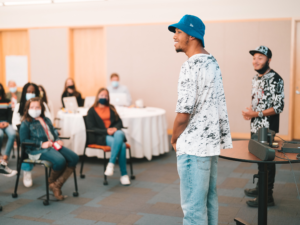Lemonade Day: Tapping Into Student’s Potential

By: Julie Eberly
“If we teach our children as we taught them yesterday, we rob them of tomorrow.” – John Dewey
Throughout American history, our society has relied upon a parent-school educational partnership to develop each child’s potential in all of the intelligences: academic, emotional, artistic, ethical and intuitive. Over the past 30 years this partnership has eroded, with parents increasingly looking to schools to provide all education, and schools’ ability to engage and educate children declining. Built on a 19th century model, America’s school system no longer speaks to our 21st century children.
Educational paradigms must continuously adapt to new realities in order to maintain their relevance to students. This means that the latest technology and wisdom must be folded into education in order to keep student interest, and therefore develop each child’s potential. According to the Small Business Administration, “Entrepreneurship education offers a solution. It seeks to prepare people, including youth, to be responsible, enterprising individuals by immersing them in real life learning experiences where they can take risks, manage the results and learn from the outcomes.” Even so, Gallup’s 2012 youth survey revealed that 45% of kids want to start their own business, 42% of kids had an idea to change the world, but only 5% were in a program that nurtured these interests.
 Lemonade Day – a free, experiential entrepreneurship program – teaches K-12 students how to start, own and operate their own small business: a lemonade stand. Over the course of several weeks, kids set goals, create plans and work their plans to achieve success. They earn real money, and use 100% of their profit to spend, save and share based on their goals. Along the way, youth build self-esteem and new mindsets that can propel them to success they may not have pursued otherwise.
Lemonade Day – a free, experiential entrepreneurship program – teaches K-12 students how to start, own and operate their own small business: a lemonade stand. Over the course of several weeks, kids set goals, create plans and work their plans to achieve success. They earn real money, and use 100% of their profit to spend, save and share based on their goals. Along the way, youth build self-esteem and new mindsets that can propel them to success they may not have pursued otherwise.
We leverage youthful optimism and foster a child’s innate desire to be productive to teach basic academic and entrepreneurship skills. Through Lemonade Day, kids tap into their potential and learn academic and character lessons that they would otherwise not acquire. In this way, Lemonade Day is stealthily changing the way educators deliver information –bridging the gap between the 19th and 21st centuries by integrating experience, technology, and fun into the school curriculum.
According to one local partner, the Lemonade Day program allows kids to “free-wheel” within the confines of structured boundaries. This freedom helps kids experience one of the fundamental aspects of successful entrepreneurism: failure. As Thomas Edison stated, “I failed my way to success.” Lemonade Day provides a platform for this critical “try – fail – revise – try again – succeed” loop while allowing kids to move toward self-identified goals in a structured manner – within a child’s existing youth activities.
This trial-error-retry-success loop is a critical milieu in which children can “learn to do”, form conviction in their knowledge, and link subjects that they learn abstractly in school to real-world applications. According to the NFTE, “81% of dropouts report they would have stayed in school if it were relevant to their lives.” Creating linkages between academic subjects and real-world situations is the cornerstone of the Lemonade Day experience, using online workbooks and simulations to enhance this effective learning loop.
Started by entrepreneur Michael Holthouse in one city and 2,600 lemonade stands in 2006, Prepared 4 Life has expanded to 32 cities and over 202,000 lemonade stands in 2013. Our short-term goal is to engage 1 million youth participants in 100 cities, with our long term vision to introduce every child in America to entrepreneurship through Lemonade Day.
Lemonade Day reaches kids across the socio-economic gamut, with a purposeful focus on at-risk kids powerless to break the poverty cycle. It gives the most disenfranchised youth a chance to taste success. One Fifth Grade Houston girl lived with her grandmother in public housing. Her parents were in jail. Family issues gave her a mindset that precluded her from accepting a scholarship to a private school in Austin that would give her a new start in life. She hesitantly participated in her school’s Lemonade Day program, setting a goal of buying a new dress for graduation. She had never had a new dress. Not only did she earn enough to buy the dress, shoes and have her hair styled, she gained enough self-confidence to pursue the scholarship and change her life. Today, she is a freshman in college.
Likewise, Detroit Public School System has historically been plagued by low attendance and high dropout rates, but on Lemonade Day 2013, DPS reported its’ highest-ever attendance: 98%, representing 52,000 students. This participation rate reveals our program’s power to engage disaffected students and families across an entire public school system. Igniting entrepreneurship in kids promotes active authorship of their own lives and sets the basis for future success.
Other children use Lemonade Day’s program to achieve different types of goals, like: the five-year-old cancer survivor who raised money for cancer research; or the nine-year old girl who raised money to provide wigs for kids whose hair had fallen out due to chemotherapy; or the seven-year old Alaskan girl who wanted to help repair her town’s naval navigation station – one of only two in the world; or the nine year old who wanted to help fix children’s cleft palates; or the kids in public housing who donated half of their proceeds to the children of tornado-ravaged Moore, OK because “those kids have nothing.”. Some parents use our program to help teach kids basic values such as working to attain a coveted toy or summer program. Other Lemonade Day veterans used their skills to open their own businesses – many of which are still running.
Each child has the potential to change the world. Sadly, most of this potential remains locked away – untapped due to an education paradigm that no longer engages our kids. Lemonade Day is bridging those gaps to tap into each child’s innate potential and develop it through hands-on fun. In this way, we are changing the trajectory of each child’s life and by extension, their families, communities and our country – one lemonade stand at a time.
Julie Eberly is the President of Lemonade Day, a national movement that teaches youth how to start, own and operate their own business through the real-world experience of a lemonade stand. Inspiring kids to set a goal, create a plan, work that plan and achieve success, they are also taught to spend some, save some and share some of their profits.





0 Comments
Leave a Comment
Your email address will not be published. All fields are required.